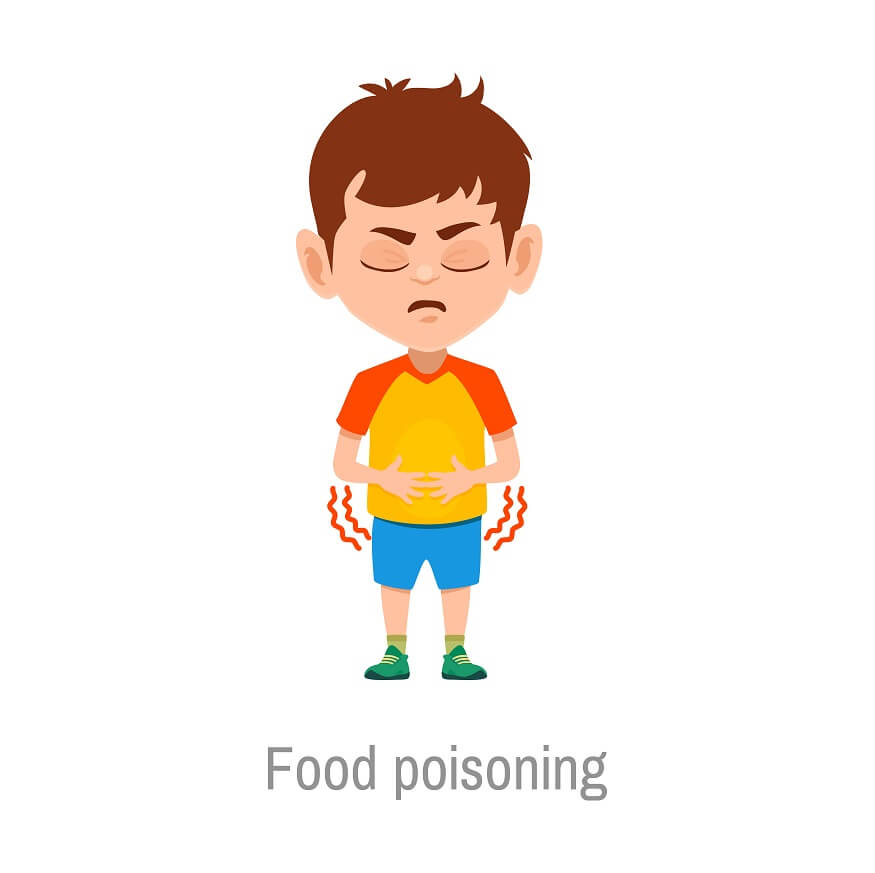We are dedicated to making sure that kids are always secure and happy. Food poisoning is regrettably one of the most prevalent health issues impacting kids globally. This insidious and stealthy condition occurs when contaminated food or beverages infiltrate their little bodies, leading to discomfort, distress, and potential complications. It is imperative that, as parents and guardians, we become knowledgeable about the underlying causes, symptoms, and best course for food poisoning treatment. By doing this, we can strengthen our resistance to this ominous danger and erect a wall of defence around our kids to safeguard their wellbeing.
Also Read: Harmful Effects of Junk Food on Students
Causes of Food Poisoning:
1. The Peril of Contaminated Food:
Food sickness often results from food contamination. Food poisoning frequently stems from the contamination of our meals. Food contamination frequently causes food sickness. A few of the harmful germs that might be present in meals have been handled or prepared poorly. In order to protect our children from illnesses brought on by tainted food, we must implement safe food practices.
2. The Hidden Hazard of Unwashed Produce:
An unlikely ally in food poisoning’s relentless crusade against children is the realm of fruits and vegetables. Unwashed produce conceals harmful bacteria, parasites, or pesticides, which stealthily target our little ones once ingested. Teaching our children, the virtue of washing their hands before meals and meticulously cleansing produce under running water can serve as a formidable defence against microscopic foes, ensuring that they develop good hygiene habits that last a lifetime.
3. The Crossroads of Cross-Contamination:
A treacherous path awaits those who disregard the risks of cross-contamination in the kitchen. This perilous phenomenon transpires when harmful bacteria from one food item infiltrate another through direct contact or tainted surfaces and utensils. Educating our children about the sanctity of safe food handling practices equips them with the knowledge to avert such dangers and maintain a healthy kitchen environment where they can confidently explore their culinary curiosity.
4. The Pitfalls of Improper Food Storage:
In the labyrinth of food poisoning causes, improper food storage is a formidable adversary that lurks in the shadows. Neglecting to safeguard perishable foods ushers in an environment conducive to bacterial proliferation, thus paving the way for food poisoning causes. Whether it be leaving cooked dishes at room temperature for prolonged periods or storing perishables in open containers, adhering to proper food storage practices is an indispensable measure in maintaining their freshness, flavour, and, most importantly, safety.
5. The Temptation of Raw or Undercooked Foods:
As the allure of diverse culinary experiences beckons, children may find themselves tempted by the prospect of indulging in raw or undercooked meats, eggs, or seafood. However, this is a perilous path to tread, as these uncooked delicacies may harbour hazardous pathogens that trigger food poisoning symptoms. Instilling in our children the importance of thorough cooking and attaining the appropriate internal temperature for these foods can dramatically reduce the risk of infection and ensure a safer gastronomic adventure where they can explore a world of flavours without fear.
Also Read: Foods Kids Should Avoid in Rainy Season
Decoding the Symptoms of Food Poisoning:
The symptoms of food poisoning may present themselves in diverse forms, depending on the child’s immune response and the causative agent.
1. Vomiting and nauseousness
Vomiting and nausea are an unwanted guest in the world of food poisoning symptom, and they may wreak havoc on a child’s health, causing discomfort and anguish. It’s crucial to take care of these symptoms every once to avoid dehydration and other problems that could result from prolonged vomiting.
2. Diarrhoea:
A relentless assailant, diarrhoea, may accompany food poisoning, causing children to experience frequent and loose bowel movements. As children’s bodies are more vulnerable to the effects of fluid loss due to their tiny size, it is crucial to provide appropriate fluid intake to prevent dehydration and maintain electrolyte balance.
3. Stomach cramps and pain in the abdomen:
Food poisoning’s cunning strategy includes the deployment of stomach cramps and abdominal pain to dishearten its victims and interfere with their daily activities. Providing comfort measures, such as applying a warm compress to the affected area and allowing them to rest can aid in alleviating these discomforts and speed up the healing process.
4. Fever:
A common side effect of food poisoning symptoms, fever indicates the body’s defensive response to invasive pathogens. Monitoring the child’s temperature and administering appropriate fever-reducing medication, if needed and under medical guidance, can help manage this symptom and provide relief from the discomfort it brings.
Navigating the Waters of Food Poisoning Treatment:
In most instances, food poisoning is a self-limiting condition that abates within a few days without the need for medical intervention.
1. Embrace Hydration:
A cornerstone of food poisoning treatment involves ensuring our little ones stay well-hydrated. Encouraging them to drink plenty of fluids, such as water, oral rehydration solutions, or clear broths, is crucial in combating the effects of dehydration resulting from vomiting and diarrhoea, as staying hydrated plays a significant role in their bodies ability to fight off infections.
2. Embrace Rest:
Amidst the turmoil of food poisoning symptoms, a respite in the form of sufficient rest can prove invaluable in fostering a speedy recovery. Allowing the child to rest and recuperate can help their immune system fight off the infection more effectively, while also providing them with the comfort and security they need during their recovery journey.
3. Embrace Caution:
During the recovery phase, prudence in dietary choices is vital. Temporarily abstaining from foods that may exacerbate stomach discomfort, such as spicy, fatty, or greasy fare, can facilitate a smoother healing process. Introducing easily digestible foods, such as plain rice, bananas, or toast, can aid in recovery and provide a sense of nourishment while they regain their strength.
4. Embrace Medical Guidance:
While most cases of food poisoning symptoms resolve without medical intervention, certain warning signs necessitate seeking immediate medical attention. High fever (above 102°F or 39°C), blood in stools, severe dehydration, persistent vomiting for more than 24 hours, and signs of infection (such as swollen glands or a stiff neck) mandate swift consultation with a healthcare professional. Seeking timely medical guidance can ensure proper management, prevent any potential complications, and offer reassurance to parents during this challenging time.
Also Read: Diarrhoea in Children Symptoms, Causes, and Solutions
Conclusion:
The responsibility and privilege of protecting their health as parents and carers go hand in hand. In the realm of food poisoning, knowledge is the sword that strikes down the lurking dangers. By unravelling the secrets of food poisoning causes, symptoms, and treatment, we arm ourselves with the power to protect our children from harm’s way. Let us embrace this knowledge and fortify our defences, as we stand united in our quest to shield our little ones from the clutches of food poisoning.
Euroschool places a high priority on its students’ health and wellbeing and is aware of the importance of teaching parents and other carers about the typical causes of food poisoning in kids. By disseminating this essential information, Euroschool hopes to provide parents and other carers with the skills they need to protect their kids from foodborne diseases and foster a safe and sanitary learning environment for all students. Through proactive education and responsible practices, Euroschool is committed to nurturing a healthy and thriving student community.










